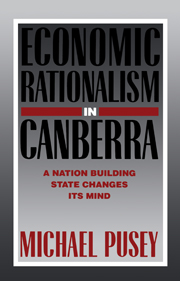Book contents
- Frontmatter
- Contents
- Preface
- INTRODUCTION: Canberra in the balance
- PART ONE Canberra: a state apparatus changes its mind
- CHAPTER 1 Images of contemporary Australia
- CHAPTER 2 Profiles of Canberra's political administrators
- CHAPTER 3 The inner triangle
- CHAPTER 4 The instrumentation of state power
- PART TWO State and society: reflections, refractions, reductions
- Appendixes
- Notes and References
- Index
CHAPTER 4 - The instrumentation of state power
Published online by Cambridge University Press: 14 January 2010
- Frontmatter
- Contents
- Preface
- INTRODUCTION: Canberra in the balance
- PART ONE Canberra: a state apparatus changes its mind
- CHAPTER 1 Images of contemporary Australia
- CHAPTER 2 Profiles of Canberra's political administrators
- CHAPTER 3 The inner triangle
- CHAPTER 4 The instrumentation of state power
- PART TWO State and society: reflections, refractions, reductions
- Appendixes
- Notes and References
- Index
Summary
Intellectual knowledge offers models which are applicable in different contexts; their validity transcends the individual situat ion…Intellectuals then are the monopolistic proprietors of knowledge which society accepts as having cross-contextual validity and which it uses to orient its members.
It is one thing to show how a group of people who obviously occupy positions of great influence come to see the world in a particular way. It is quite another to show how this affects what they and others do. Studies of elites are so often of disappointing and limited sociological interest because strong descriptions of elite cultures normally lapse into weak or vicarious explanations of their social effects and structural corollaries. Exactly the same problem hangs over the more interesting modern literature about the role of intellectuals in contemporary industrial societies. It is one thing to describe how various groups of highly trained people define this or that social phenomenon but, if the account goes no further, it amounts to little more than idealist fantasy.
There is no escape from these fundamental questions concerning the relation between ‘ideas’, structures, and actions. We do empirical research not to escape from these questions but, on the contrary, to give us some concrete particulars with which to address them anew, and with greater stability of reference than would otherwise be possible.
In starting to draw the threads of the preceding chapters together, we must ask how these ‘images of society’, ‘political dispositions’ and, in short, the orientations to action of our Canberra top public servants are in fact patterned into the state apparatus. Chapter 3 covered some of that ground by laying out the differences among officers in our three categories of departments - the central agencies, the market-oriented departments, and the program and service departments.
- Type
- Chapter
- Information
- Economic Rationalism in CanberraA Nation-Building State Changes its Mind, pp. 111 - 156Publisher: Cambridge University PressPrint publication year: 1989



